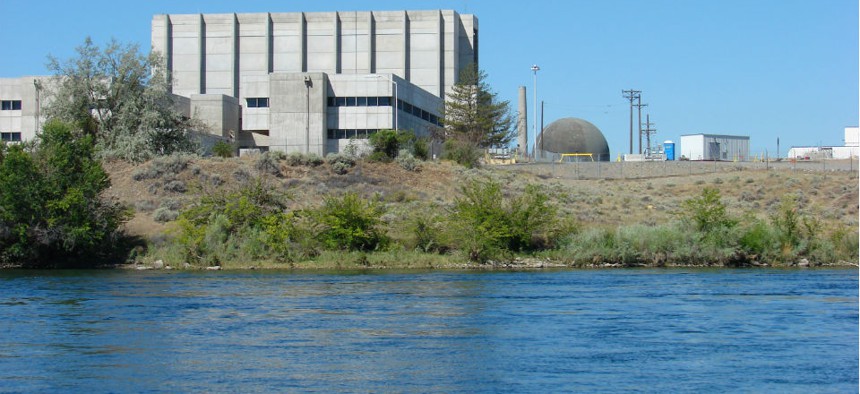
Reactor at the Hanford Nuclear Reservation. J.D.S. / Shutterstock.com
Nuclear Site Whistleblower Ordered Back on the Job
OSHA finds Energy Department contractor retaliated in terminating her.
An environmental safety specialist who had been fired in 2011 by an Energy Department contractor was ordered reinistated on Tuesday after the Labor Department determined that the employer retaliated against her for raising concerns about atomic waste disposal procedures at the Hanford Nuclear Reservation in Washington state.
The Occupational Safety and Health Administration’s assistant regional manager determined that the Richland, Wash.-based Washington River Protection Solutions, owned by URS, must pay more than $220,000 in back wages and other expenses.
Though Labor did not release the employee’s name, whistleblower advocacy groups and the office of Sen. Ron Wyden, D-Ore., released the OSHA letter identifying her as Shelly Doss, a 20-year veteran of the contract workforce at Hanford.
The World War II-era decommissioned nuclear processing plant on the Columbia River has been the setting for other whistleblower complaints that have been the subject of congressional hearings.
According to the OSHA letter, Doss “repeatedly reported nuclear and environmental safety and permit and record-keeping violations.” But soon she was relieved of virtually all her work assignments. and the employer advertised the position as vacant, refusing “to rehire the employee despite adequate qualifications and previous satisfactory performance reviews.” In October 2011, after she continued to report environmental noncompliance as required by her job, she was terminated, and filed a whistleblower complaint with the Labor Department.
Doss suffered emotional damage from “harassment,” according to her attorney, Tom Carpenter of the nonprofit Hanford Challenge. He said Doss in 2012 filed an amended complaint after the company entered into a mediated settlement agreement and reinstated her with promises to support her in her new position, provide training, and not retaliate any further. But OSHA this month found that “the layoff was actually a firing,” and that “there is sufficient evidence to show Doss was blacklisted.”
"The people most able to identify hazards are often the workers who are threatened by them," said Galen Lemke, OSHA's acting regional administrator. "Employees must never be punished for sounding an alarm when they see a problem that could injure, sicken or kill someone, or harm the environment."
Wyden told Government Executive he is pleased with Labor’s decision to reinstate Doss. “However, I remain very concerned that the Labor Department’s investigation in her case confirms that the Energy Department must correct systemic problems with the safety culture and retaliation against whistleblowers at Hanford,” he said. “It is time for Shelly to get back to work and for DOE to ensure Hanford workers can share threats to public safety without threat of reprisal.”
A spokesman for Washington River Protection Solutions said the firm is currently reviewing the department’s order, which it received Tuesday, and that no decision has been made on whether to request, within 30 days, a hearing before an administrative law judge.
“The employee was one of more than 200 employees who were laid off by the company in the fall of 2011 to align its employment levels with project work scope and federal funding,”
External Affairs Manager Jerry Holloway said. “The employee’s raising of safety or environmental questions was not a factor in the selection for lay-off. Washington River Protection Solutions is committed to conducting its work at Hanford safely and in compliance with applicable requirements. Each WRPS employee is empowered and encouraged to raise safety or other workplace concerns.”
Carpenter said Doss “properly reported and documented numerous environmental violations in a professional manner, and suggested ways to resolve those issues. Instead of praising her, WRPS management vilified her, ruined her career, and illegally fired her from her position. For the Employee Concerns Manager to participate in this behavior shows how out of touch with the law this company truly is when it comes to safety and ethics.”
In addition to paying Doss’ back salary, damages, interest and attorney’s fees, the company must delete disciplinary information from her personnel file. And it must display posters on the worksite reminding employees of whistleblower protection and "Your Rights Under the Energy Reorganization Act.”







